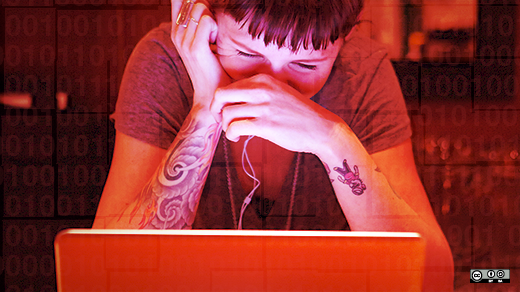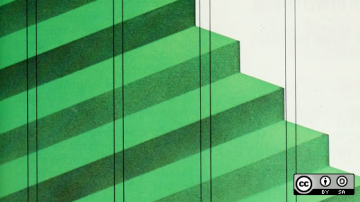Witnessing the ongoing global impact of COVID-19 is a profoundly affecting experience that continues to humble us all in ways we couldn't have anticipated. Technology organizations are quickly evolving within this new reality, in which all of our human interactions are virtual until further notice.
Virtual open source community management
When it comes to nurturing cultures designed to promote and reward open source innovation—as well as communities' economic, technological, and physical wellbeing—I can best speak to those I help build and manage. I believe communities should be built by weaving a tapestry of demographics and ranges of expertise. They should do this in a way that facilitates rich communication and empowers those building open source software to share knowledge with each other.
The move to virtual connection and digitalized events only makes these methods more crucial.
I'll share an example. Recently, I was speaking with a pillar of the Traefik open source community, known as a Traefik Ambassador, based in Turkey, over video conference about a potential webinar. He suggested that, instead, we expand the speaker set to include other community members. Soon, we'd invited other contributors from Poland and Switzerland. We met online, and out of that conversation, the webinar has evolved into a collaborative series with community members taking turns presenting insights and melding different types of software together. What struck me was that if we'd had this conversation just one month ago, it would have simply focused on the creation of an asset. Now, contributors are bonding over a purpose-driven creation, with greater intention around facilitating innovation and excitement.
Based on my experience building and growing open source communities, I believe that this new era of virtual connection offers an unprecedented opportunity for innovation and growth—as long as it is managed with equal focus on the people creating it. Below are five observations on how the world of open source can positively shape the future of innovation in a virtual and seemingly uncertain world.
The virtual world is flat.
Open source communities, teams, and backing companies provide an exceptional model of how to accelerate innovation. That's especially true in these extraordinary times. At its core, open source democratizes the development process, something we see replicated more widely in our new virtual ecosystems. As the opportunity for input becomes more inclusive, organizations are seeing a flattening in infrastructure, both in communications and in operations. Existing hierarchical power structures are weakening as more voices are heard, and the best ideas are given the chance to rise to the top through greater exposure.
As social distancing makes backchannel and handshake agreements much more complicated to execute, I predict that the traditional dance required to access and take positions in leadership will be replaced by flatter, more open methods that ultimately produce fresher—and better—perspectives. Online communication has a way of laying bare the real substance of interactions and ideas, bolstering meritocracy that's central to the strength of open source.
The virtual world is fast.
This "flattening" structural shift has the potential to increase the pace and quality of innovation, as virtual events and communications widen the spotlight to now shine a light on previously unseen contributors. Creative minds among engineers, developers, and others outside of traditional leadership positions will leverage their comfort with the web and virtual channels to find each other and collaborate faster. This is nothing new for those in open source, and I expect organizations still clinging to legacy approaches will find themselves investing in learning how to implement flatter, virtual communications structures, and beginning to build them into traditional operational models. This means doubling down on efficiency and being willing to let go of the "it's always been done this way" mentality.
The virtual world needs community.
Developers can conserve energy attending virtual events: there's no commute, nor other distractions from the work at hand. Working remotely and connecting only via virtual mediums enables open source contributors to create, share, and use code just about as fast as their brains allow, empowering rapid code contributions, collaborations, and new solutions produced with velocity.
While this shift may result in productivity gains, organizations must be careful of creating the impression that a team member's most important asset is their brain. When open source developers were asked what the best part of their job was, 62% claimed it was their "personal passion." Recognizing individuals as unique contributors to open source communities is necessary and essential to development—both technical and human. During this period, when we're hitting the pause button on in-person interaction, remote interactions via chats, video conferences, and phone calls will enable the human moments necessary for growth and connection. Those in open source rely on the power of community, and this extraordinary time will require the continuous and earnest commitment to it.
The virtual world is composed of individuals.
The potential for greater innovation and meritocracy through virtual-only channels will only be realized if communities, organizations, and individuals also pursue and achieve wellness. It's crucial for the interpersonal bonds that maintain our energy and psychological health—traditionally forged through real-life, face-to-face contact—to continue to exist as part of the way we now work. If that disappears, there's the risk that our industry and communities become purely transactional, lacking the joy and drive that carries work forward, much less great work and innovation. Developers are especially rooted in a sense of purpose, with only 3% reporting that money and perks were the best part of their job.
Overall wellness and support to prevent burnout should already have been central considerations for modern organizations, but they are even more important now. Virtual connectivity may set us up to work fast, but that can backfire if we're not also set up to be well.
The virtual world needs kindness.
I also predict that virtual-only communication will close the distance between our online avatars and ourselves as real people. The impact of "toxic" individuals, hidden behind a computer, with little to no consequence for being a "bad actor," will be reduced and less acceptable. A growing presence of new voices will set the tone, adhering to well thought out codes of conduct, making poor behavior explicitly unwelcome. As much of our connection moves online, the norms that guide our offline behavior will become increasingly important. We'll transition to a less individualistic paradigm, and open source's long history of considering what defines good citizenship will offer insight to those looking to integrate a sense of shared responsibility into organizations.
I feel extremely grateful to be in technology, particularly in the open source world, given it's an industry built upon the promise of innovation. At least for the moment, we as an industry can serve as a lighthouse for connection in difficult times, and as a model for collaboration and intention for those not as familiar with how to be highly productive in a virtual world. For the open source community and beyond, there is a great opportunity to lean into creating as much beneficial virtual culture as we can. Through this experience, we'll all learn new ways of interacting, which will serve us well in the future.









1 Comment